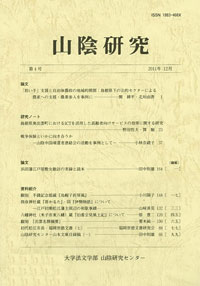島根大学法文学部山陰研究センター
ISSN:1883-468X

ダウンロード数 : ? 件
この文献の参照には次のURLをご利用ください : https://ir.lib.shimane-u.ac.jp/6827
山陰研究 1
2008-12-31 発行
限界集落に生きる人々の「語り」の共有化の試み : 島根県雲南市掛合町の一集落を事例として
An experimental study for sharing "the stories" among the people in a marginal village : A case study in the community of Kakeya-cho, Unnan-shi, Shimane
ファイル
内容記述(抄録等)
人口が流出し過疎化し続ける農山漁村の集落では,その集落を存続させ続ける担い手が減少の一途をたどっている。担い手が減少し続ける集落は,その維持に限界が来る状況になっている。近年限界集落に対する研究が行われているが,その中に,限界集落対策は,限界化初期において対応すべきであり,その場合重要になるのは,限界化が進行する時期に生じる住民の「あきらめの意識」の拡がりを阻止し,除去するための対応であるという研究がある。島根大学法文学部社会学研究室では,限界集落への支援の試みとして,島根県内の中山間地域の一集落を対象とし,2007年度に「聞き書き文集プロジェクト」を企画・実施した。本プロジェクトの目的は以下の2点,すなわち,(1)過疎化・高齢化が進む集落の住民による語りを通して,生き甲斐や地域への思い等を調査すること,(2)外部(研究者等)から新たなコミュニケーション通路を提供することが地域住民間に思いの共有化などの効果をもたらすのかについて測定すること,である。これらの目的を実施するために集落住民の語りを「文集」化し,集落住民への文集作成効果を測定した。
文集に見られる住民の「語り」から以下のこと,すなわち,(1)中山間地域に住む人々の生き甲斐は,個人的志向のものよりも,むしろ他者との関係性を志向するものが多い,(2)集落住民の地域への思いは強く,地域的愛着も強い。また貢献意欲も強い,(3)地域における高齢化の進行に伴い地域が抱える諸問題が増加している,ことなどがわかった。
また,文集作成による住民への効果は以下の3点に整理できる。すなわち,(1)文集作成の過程における「語り」によって,「自己確認」の効果,(2)「家族」においては,夫婦間で地域の人々の思いを共有する効果,(3)「地域社会」における「文集」作成は,日常生活では可視化しにくい地域住民一人一人の「思い」を表面化させ,それを地域の他の人々と「共有化」する可能性をもたらす効果,である。
以上のように,外部から介入して作成する「文集」は,自分を振り返る自己確認や家族・地域における思いの共有化などの効果がある程度期待できることがわかったが,文集作成は地域社会において,次の実践的意味を持つと考えられる。(1)「文集」作成は,集落住民の「思い」の共有化をもたらし,集落住民間の連帯を強め,「互助」を活性化させるという形で機能する。(2)自治体等が,量的に制約のある公的援助を有効に活用するためには,「住民が生活する上で本当に何を求めているのか」について知り,最も求められているものに優先順位をつけて対応していかざるを得ないが,住民の生の声を聞くために「文集」作成を推進し,記述された「語り」の内容を支援策の策定に役立てることができる。
文集に見られる住民の「語り」から以下のこと,すなわち,(1)中山間地域に住む人々の生き甲斐は,個人的志向のものよりも,むしろ他者との関係性を志向するものが多い,(2)集落住民の地域への思いは強く,地域的愛着も強い。また貢献意欲も強い,(3)地域における高齢化の進行に伴い地域が抱える諸問題が増加している,ことなどがわかった。
また,文集作成による住民への効果は以下の3点に整理できる。すなわち,(1)文集作成の過程における「語り」によって,「自己確認」の効果,(2)「家族」においては,夫婦間で地域の人々の思いを共有する効果,(3)「地域社会」における「文集」作成は,日常生活では可視化しにくい地域住民一人一人の「思い」を表面化させ,それを地域の他の人々と「共有化」する可能性をもたらす効果,である。
以上のように,外部から介入して作成する「文集」は,自分を振り返る自己確認や家族・地域における思いの共有化などの効果がある程度期待できることがわかったが,文集作成は地域社会において,次の実践的意味を持つと考えられる。(1)「文集」作成は,集落住民の「思い」の共有化をもたらし,集落住民間の連帯を強め,「互助」を活性化させるという形で機能する。(2)自治体等が,量的に制約のある公的援助を有効に活用するためには,「住民が生活する上で本当に何を求めているのか」について知り,最も求められているものに優先順位をつけて対応していかざるを得ないが,住民の生の声を聞くために「文集」作成を推進し,記述された「語り」の内容を支援策の策定に役立てることができる。
Rural communities have played various roles that go beyond agricultural production. Recently, because of the rising age of the rural population, in addition to conventional roles (e.g., funeral rites and traditional events), the community is expected to play the roles that families have traditionally played (e.g., caring for elderly and doing household chores). As a result many rural communities in the hilly and mountainous areas are in a state of crisis because the number of people and households continues to decrease.
Those communities in which the people can no longer play many of their roles are referred to as "marginal villages" and seen as a serious problem for the residents' well-being. Especially, keeping residents from losing their purpose in life may become a matter of vital importance in such marginal villages.
Although everyone has his/her own meaning or joy in life, our previous study suggests that people in marginal villages tend to want to get a feeling of really living through experiences that demonstrate that the significance of their existence is accepted and understood by other people. This tendency may be related to the fact that residents of marginal villages are at a disadvantage in terms of doing activities and work.
Based on this idea, we developed an anthological study that records what the researchers heard. This project aimed to collect the live voices of the people in a marginal village and then give them those voices in the anthological form. It was an experiment to give the people the opportunity to rediscover their neighborhood.
This study was carried out in a marginal village in Kakeya-cho, Unnan-shi, Shimane prefecture. In 2007, we conducted interviews with 17 residents (total population 39), organized the stories they told the researchers, and published them in an anthology. After publication, we interviewed the same people again in order to assess the influence of the anthology.
As a result, we found the following:1) the anthology might cause mutual understanding among the people;2) telling their own things to other people to make the anthology might bring them the real feeling of their own lives. From these findings, we suggest that the anthology project as an approach from outside could contribute to the well-being of the residents in marginal villages.
It is certain that such an approach is nothing but a first step. Verifying whether the mutual understanding brought about through the anthology causes the revitalization of the community should be investigated further in the future.
Those communities in which the people can no longer play many of their roles are referred to as "marginal villages" and seen as a serious problem for the residents' well-being. Especially, keeping residents from losing their purpose in life may become a matter of vital importance in such marginal villages.
Although everyone has his/her own meaning or joy in life, our previous study suggests that people in marginal villages tend to want to get a feeling of really living through experiences that demonstrate that the significance of their existence is accepted and understood by other people. This tendency may be related to the fact that residents of marginal villages are at a disadvantage in terms of doing activities and work.
Based on this idea, we developed an anthological study that records what the researchers heard. This project aimed to collect the live voices of the people in a marginal village and then give them those voices in the anthological form. It was an experiment to give the people the opportunity to rediscover their neighborhood.
This study was carried out in a marginal village in Kakeya-cho, Unnan-shi, Shimane prefecture. In 2007, we conducted interviews with 17 residents (total population 39), organized the stories they told the researchers, and published them in an anthology. After publication, we interviewed the same people again in order to assess the influence of the anthology.
As a result, we found the following:1) the anthology might cause mutual understanding among the people;2) telling their own things to other people to make the anthology might bring them the real feeling of their own lives. From these findings, we suggest that the anthology project as an approach from outside could contribute to the well-being of the residents in marginal villages.
It is certain that such an approach is nothing but a first step. Verifying whether the mutual understanding brought about through the anthology causes the revitalization of the community should be investigated further in the future.
Other Article
